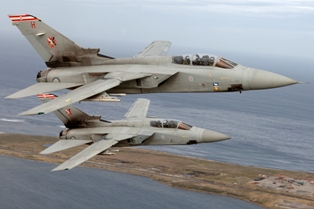THERE will be no further inquiry into the collision of two RAF tornado jets that led to the death of three pilots in 2012.
On 3 July 2012 a collision between two RAF Tornado aircraft occurred over the Moray Firth, which led to the deaths of RAF aircrew Hywel Tomos Poole, Samuel Edward Bailey and Adam Mark Sanders.

Following this tragic accident Crown Office’s Scottish Fatalities Investigation Unit began an investigation into the deaths. The Director General of the Military Aviation Authority, a senior RAF officer who is independent of the RAF chain of command, instructed a Service Inquiry to investigate the circumstances of the accident.
The investigation was conducted by the Military Aviation Authority. The Service Inquiry Report was published on 30 June 2014 and is a very detailed document which considers all of the relevant factors in a forensic manner. Furthermore, the Service Inquiry Report considers important matters which would be beyond the remit of any Sheriff presiding over a Fatal Accident Inquiry (FAI).
The report’s conclusions reveal all of the contributory causes of this accident, including the difficulties in operating with a split squadron (half of the squadron being then based in Cyprus), the lack of procedures to achieve deconfliction at the flight briefing stage, as well as the failures to have a working Secondary Surveillance Radar on the day of the collision.
It also exposed the fact that one of the two aircraft did not have a working Radar Homing and Warning Receiver that day.
The Service Inquiry considers in great detail the repeated failures to introduce a collision avoidance system for Tornado aircraft. It emphasises the need for provision of such a system in current and future aircraft in the RAF fleet.
All of the Service Inquiry’s recommendations have been accepted by the Ministry of Defence and are in the process of being implemented, including installation of collision warning systems.
The purpose of a Fatal Accident Inquiry is set out in law to establish the cause of death and ensure that lessons are learned for the future.
After thorough consideration of the circumstances of the case, Crown Counsel have concluded that all the relevant issues have been comprehensively examined in the course of the Military Aviation Authority report and could not have been better considered in any FAI, which would only duplicate the months of thorough work undertaken by the Military Air Accident Investigation Branch and the Military Aviation Authority in preparing the Service Inquiry. As a result, Crown Counsel have instructed that no FAI is to be held.
David Green, Head of the Scottish Fatalities Investigation Unit, said:“Crown Counsel carefully weighed up the full circumstances of the case, and concluded that a Fatal Accident Inquiry could not better and would only repeat the highly detailed investigation into the tragedy already conducted by the Military Aviation Authority.
“The Service Inquiry Report which they produced also contains conclusions and recommendations which are more wide ranging than could be expected to be achieved in a Fatal Accident Inquiry.
“The RAF and MOD have accepted the recommendations of the Service Inquiry Report, and the nearest relatives of those who tragically died in this accident have been advised of Crown Counsel’s decision.”
The Service Inquiry has been published and can be accessed via the following link: https://www.gov.uk/government/publications/service-inquiry-accident-involving-tornado-zd743-and-tornado-zd812-over-moray-firth.